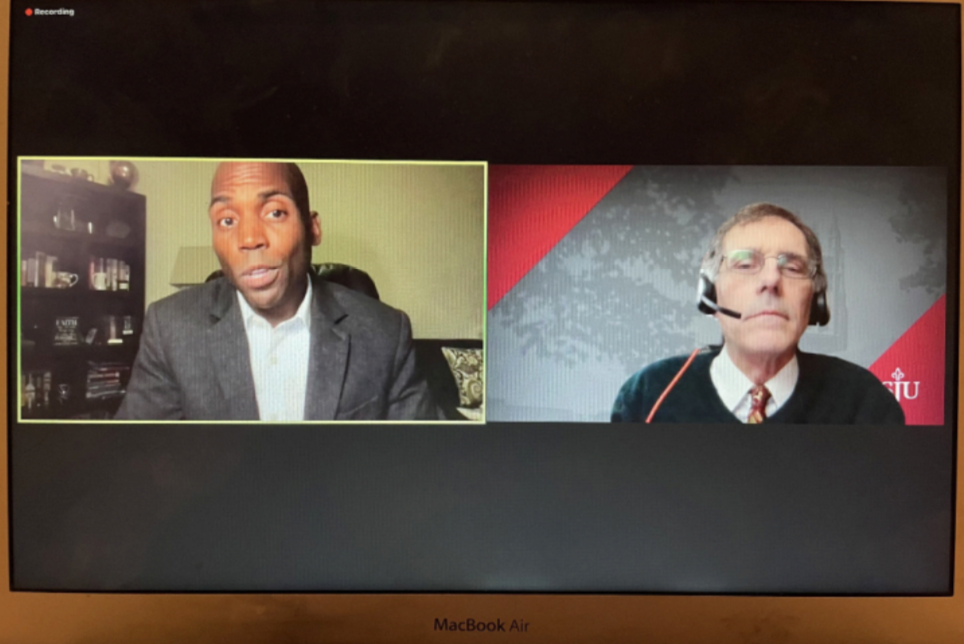Yohuru Williams, Ph.D., Distinguished University Chair and professor of history and founder of the Racial Justice Institute at the University of St. Thomas, delivered a Zoom lecture, “The Fire This Time: Racial Justice, Catholic Social Teaching, and the Promise of Jesuit Education in the Age of Black Lives Matter” on Nov. 4.
This lecture was the second of the three-part Joseph William and Madeline Eberle Klein lecture series sponsored by the St. Joe’s Faith Justice Institute. This particular lecture was co-sponsored by the Center for Inclusion and Diversity (CID).
Around 110 members of the St. Joe’s community registered, making this the Faith Justice Institute’s most attended event so far this semester, according to Ann Marie Jursca-Keffer, director of the Faith Justice Institute.
Jursca-Keffer invited Williams to campus after learning about his advocacy work at the Commitment to Justice in Jesuit Higher Education conference held for the Association of Jesuit Colleges and Universities.
“I think he did a wonderful job of weaving critical race theory and both historical and current day Catholic Social Teaching Jesuit values into not only a story with a multiplicity of voices, but also a hopeful story, which calls everyone to act,” Jursca-Keffer said.
At the core of the lecture, Williams drew a connection between Catholic Social Teaching and activism, which can be applied to movements such as the Movement for Black Lives.
“If we practice Catholic Social Teaching, removing root causes to improve structures, thinking about meeting basic needs, we will be practicing the work of Catholic Social Teaching,” Williams said during the lecture.
Catholic Social Teachings follow seven themes with the mission of creating a more just society: life and dignity of the human person; call to family, community and participation; rights and responsibilities; option for the poor and vulnerable; the dignity of the work and the rights of workers; solidarity; and care for God’s creation.
Community members don’t always see the connection between Catholic Social Teachings and activism, but events like these provide opportunities to grow in this way, according to Nicole Stokes Ph.D., associate provost of Diversity, Equity and Inclusion.
“This connection between the [Jesuit] mission and the university’s values and the work of diversity, equity and inclusion is there,” Stokes said. “But making people aware of the connection, I think, is the place where we continue to work in this area.”
One of the major problems, according to Williams, is that communities and individuals might have the tools to make change, but are not using those tools.
“Those who have the capacity and the knowledge…to respond in a way that privileges love and humanity, and hope and justice, but don’t because they can’t see themselves in any tangible way making a difference, that in and of itself is part of the problem,” Williams said
Tao Nguyen ’22, a placement liaison for the Faith Justice Institute, attended the lecture and said her biggest takeaway was the focus on taking action.
“I specifically like this [Klein lecture] because it kind of opened my eyes,” Nguyen said. “There was one thing that Dr. Williams had said about how a lot of people are well intentioned, but intention isn’t good enough, it must be really acted upon.”
Richard Warren, Ph.D., professor of history and academic director of the Faith Justice Studies minor, moderated the lecture. Having been a part of the campus community for over 25 years, and being heavily involved with the mission of the Faith Justice Institute, Warren said he found value in the message of taking St. Joe’s Ignatian roots and using them to make change.
“Over the years that I’ve been here, we are part of a larger society that has its challenges in addressing questions of justice, and in our own community, we have had places where we have fallen short,” Warren said. “There is a vigilance required to live out that ideal of taking the Ignatian ideas that root this institution in things that transcend our present moment.”
While Williams called individuals to act, he also emphasized how important it is to understand the entire scope of activism.
“Don’t lose the imaginative side of activism,” Williams said. “Activism doesn’t end when the statue comes down, activism doesn’t end when the ballot passes.”
This Klein lecture has been recorded and can be found on the Faith Justice Institute website. The next Klein lecture will be held on Nov. 16 via Zoom.















































